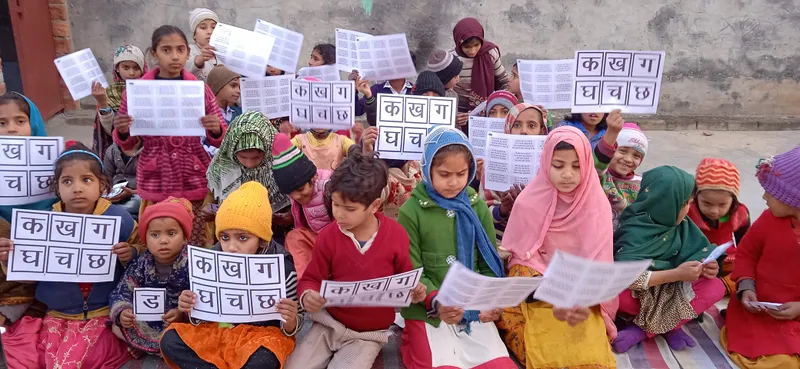This 22-year-old from a UP village is educating rural communities on climate change
Hina Saifi is one among 16 women champions who have been given a platform to address the climate crisis by the Women Climate Collective (WCC). For the past five years, she has worked in fields like environmental protection, sustainability, and renewable energy.
Twenty-two-year-old Hina Saifi is currently pursuing an MBA from the Bharti Institute of Technology, Meerut. Almost a decade ago, this resident of Sisola, a backward village in UP’s Meerut district, would not have dreamed of studying beyond the eighth standard, much less going to college.
And higher education is not the only thing Hina has managed to achieve in life. She is among 16 women champions who have been given a platform to address the climate crisis by the Women Climate Collective (WCC).
Supported by 10 diverse organisations, the Collective aims to inspire women to use their voices and participate in climate conversations, empowering them to be part of the solution to drive equitable outcomes.
Hina was also part of the We The Change campaign launched by the United Nations in 2021, which showcased climate solutions pioneered by young Indians as a celebration of India's climate leadership.

Hina Saifi
Her story is also one of incredible grit.
Sisola has only one school offering classes until the eighth standard, and Hina’s parents were not keen to send her to one outside her village. Her mother intervened and sent her to her aunt’s house in Khatauli to complete her 10th standard.
It was another uphill battle to finish her 12th standard after she returned home. Mukesh Kumar, an officer with NGO, N Block, intervened and convinced her family to send her to college.
Most of the men in the village worked in stone quarries, while the women and children worked in a football factory, earning a meagre Rs 20 for stitching a football.
"Poverty is rampant in my underdeveloped village, and child labour is common here. I, too, was advised to stop studying after I finished the eighth standard. However, I stuck to my decision to study further. To support myself through school and to help my family, I also worked part-time in a football factory,” Hina tells HerStory.
While she was still a young girl, Hina became aware of many things. The main challenge was most families were reluctant to send their children to school as they could earn in the football factory and contribute to the family income.
Education for impact
Hina discovered that the lack of education translated into other issues—the village was dirty with garbage strewn about or thrown in ponds or the river and rampant burning of waste.
“There were no toilets, and people were defecating in the open. The domestic animals were also left out in the open, drains were overflowing, and people from other parts of the region were reluctant to visit their relatives in our village,” she says.
Hina realised the first challenge to take head-on was to get the children to school. Along with her teacher, she visited people in the village and convinced children not to drop out. She joined a local NGO, N Block, and started attending workshops and sessions on climate change.
“I was also the first girl from my village to travel to Lucknow and be part of the Climate Agenda initiative in 2018. I learned about air pollution, the air quality index, and understood that fighting climate change is our collective responsibility and not just of the government,” she adds.
She went about educating the people in her village to first send their children to school. She argued that education will help them understand the importance of cleanliness and climate change.
Recently, she launched 'Suraj Se Samriddhi', a campaign to raise awareness about the benefits of solar power and disperses information about the value of rooftop solar installations in public buildings and about solar pumps and solar-powered air pollution solutions.
Change at grassroots level

Teaching them young. Children at the village school.
Hina frequently organises poster-making activities in schools and encourages children to research related subjects and give speeches.
“I reach out to more women, as they are the target group that faces its effects more. They work at home and outside, take care of their families, and have to take steps to mitigate this problem” she says.
Hina is also closely connected to the '100% Uttar Pradesh' initiative and knows that to spark change at a macro level, grassroots activities are a must.
“I work hard to bring about public awareness and to mobilise positive action through activities like pamphlet distribution, public meetings, door-to-door visits, and surveys. I firmly believe that when individuals change micro-behaviours, they can bring about massive transformational change,” she says.
She also points while education can work towards the alleviation of poverty, it can also impact climate change.
“There is a huge difference now after more children have enrolled in the school. They also come to me for tuition. Now, parents are not averse to sending children to schools outside the village. They now want their children to be like me,” she says, with a smile.
Hina regularly has discussions with the village Pradhan (local head) to initiate new projects in the village. The roads are clean now, and even the pond and river are waste free. Also, trees have been planted along the river as part of a beautification drive.
“The Women Climate Collective has given us a platform to raise our voice on environment-related issues. These powerful voices of women will go far in achieving the objective of fighting change and bringing in socio-economic development,” Hina adds.
Edited by Affirunisa Kankudti






